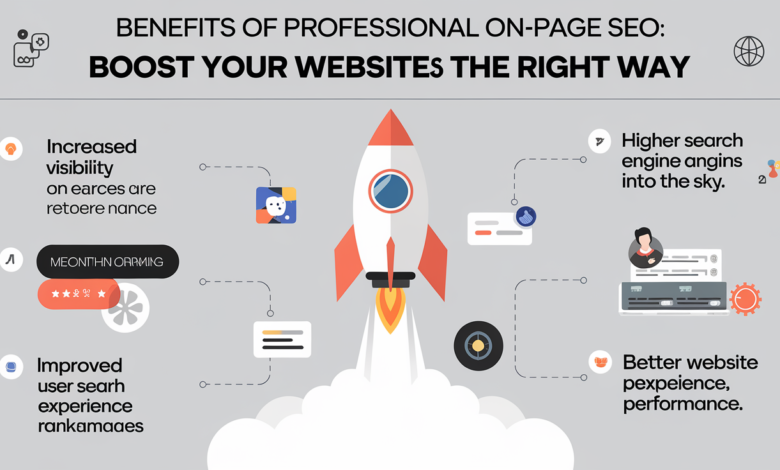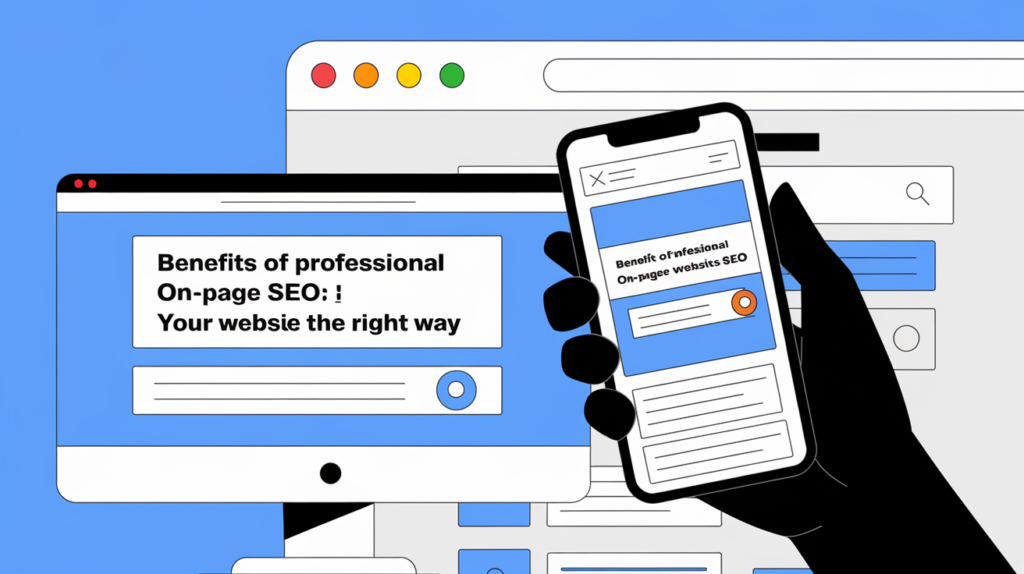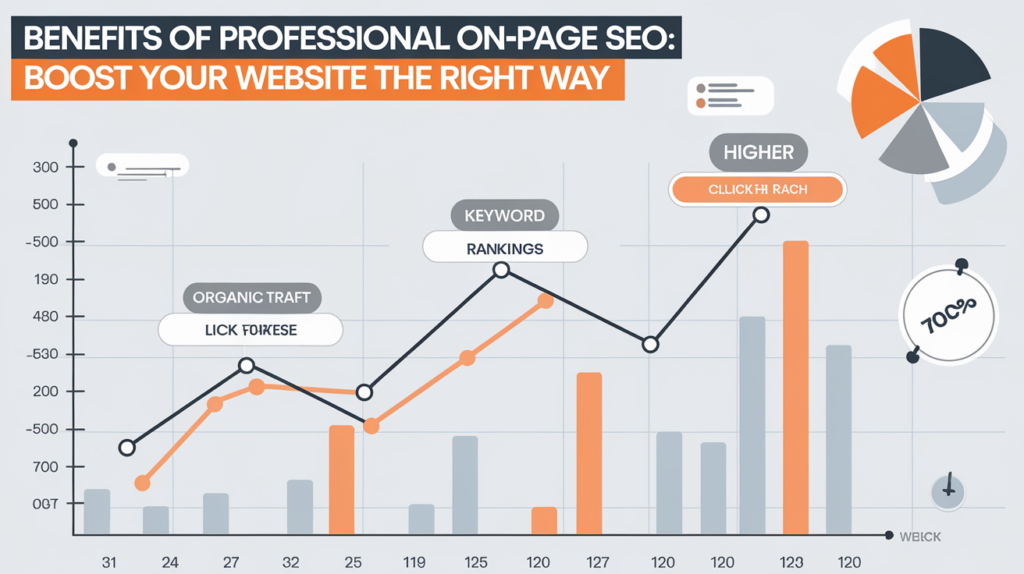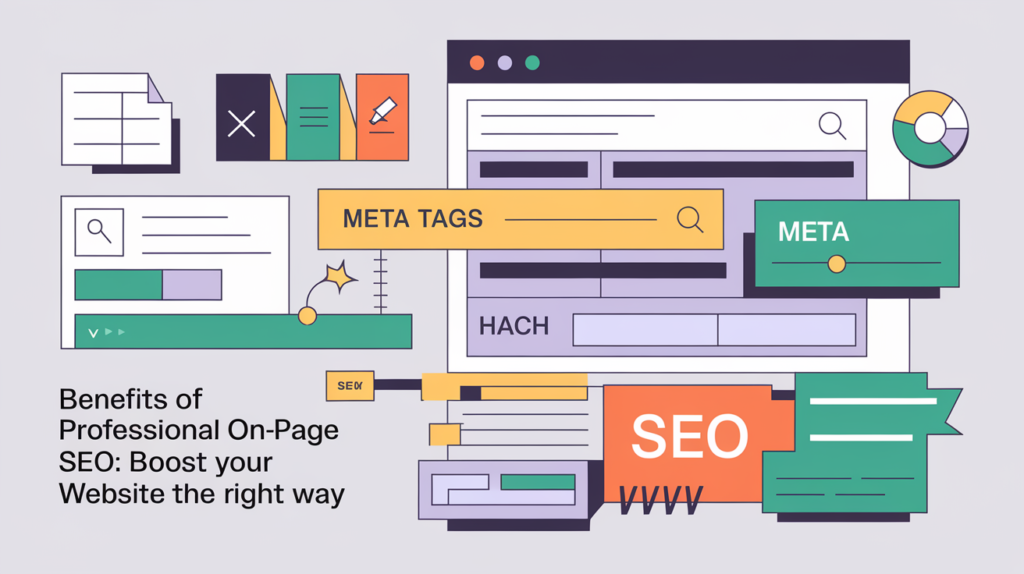Benefits of Professional On-Page SEO: Boost Your Website the Right Way

Table of Contents
Benefits of professional on-page SEO are huge for any website. It helps your site rank higher on Google, bringing more visitors and potential customers. Without proper SEO, your website might stay hidden, making it hard for people to find you online.
Professional on-page SEO improves many things like keywords, meta tags, and page speed. Experts ensure your website is easy to read, loads fast, and works well on all devices. This makes your site more user-friendly, which Google loves. A well-optimized website attracts more traffic and grows your business over time.
What Are the Benefits of Professional On-Page SEO?
The benefits of professional on-page SEO help websites grow faster. It improves rankings on search engines like Google, making it easier for people to find your site. A well-optimized page attracts more visitors and increases business opportunities.
SEO experts use special techniques to improve website content. They optimize titles, headings, and keywords to match what users search for. This helps search engines understand your website and rank it higher.
A professionally optimized website loads quickly and looks good on all devices. This makes users stay longer, reducing bounce rates. When people enjoy using your site, Google ranks it better, bringing even more traffic.
Good on-page SEO also improves website credibility. Search engines trust websites with high-quality content, proper structure, and useful information. This means a well-optimized site is more likely to attract loyal customers.
Why Your Website Needs Professional On-Page SEO Today
Many websites struggle to get traffic because they are not optimized. Professional on-page SEO ensures your site follows the latest rules and trends. It keeps your content updated and relevant, improving visibility.
Google changes its ranking rules often, and experts keep track of these updates. They adjust SEO strategies to match new guidelines. This ensures your website stays ahead of competitors and remains searchable.
User experience is an important part of on-page SEO. Experts make sure your website is easy to read, loads fast, and has clear navigation. These factors help users stay longer and explore more pages.
Investing in professional SEO saves time and effort. Instead of guessing what works, experts apply proven strategies to increase traffic. This helps businesses grow faster and reach their target audience more effectively.
How Professional On-Page SEO Helps Your Business Grow

A well-optimized website brings more potential customers. Professional on-page SEO improves search rankings, making it easier for people to find your business online. More visitors mean more chances to sell products or services.
SEO experts research the best keywords for your business. They use them naturally in content, headings, and descriptions. This helps attract the right audience and increases engagement on your site.
Optimized websites build trust with users. When visitors find useful and well-structured content, they are more likely to return. A good reputation also increases word-of-mouth recommendations, bringing in even more customers.
Higher rankings on Google lead to better brand awareness. When your website appears in top results, more people recognize your brand. Over time, this helps your business grow and stay ahead of competitors.
The Power of Keywords in Professional On-Page SEO
Keywords are the foundation of SEO. They tell search engines what your website is about. Professional on-page SEO ensures the right keywords are used in the right places, improving rankings.
Experts research high-value keywords that match what users search for. These words appear in titles, headings, and body text naturally. This helps search engines understand and rank your content properly.
Long-tail keywords are also important. These are specific phrases that match user intent. For example, instead of “SEO tips,” a better keyword would be “best SEO tips for beginners.”
Using too many keywords can hurt rankings. Professionals balance keyword usage to ensure content remains natural and user-friendly. This improves readability and engagement while boosting SEO performance.
Meta Tags: A Secret Weapon in Professional On-Page SEO
Meta tags help search engines understand your website. Professional on-page SEO includes optimizing meta titles and descriptions to attract more clicks.
Key Meta Tags for Better SEO
- Title Tag: The clickable title that appears in search results. It should include the main keyword and be under 60 characters.
- Meta Description: A short summary of the page. It should be engaging, informative, and under 160 characters.
- Header Tags (H1, H2, H3): These organize content, making it easier for users and search engines to read.
A well-written meta title increases click-through rates. When people see a clear and engaging title, they are more likely to visit your page. A strong meta description also encourages users to click on your website.
Search engines use meta tags to rank content. If they are well-optimized, your website stands a better chance of appearing on the first page of search results.
How Professional On-Page SEO Improves User Experience
A website that is easy to use keeps visitors engaged. Professional on-page SEO focuses on making pages user-friendly, improving overall experience.
Ways SEO Improves User Experience
- Fast Loading Speed: Users leave slow websites quickly. Optimized images and caching techniques improve speed.
- Mobile-Friendly Design: More people browse on mobile devices. A responsive design ensures the site looks good on all screens.
- Clear Navigation: Easy-to-use menus help users find what they need without frustration.
User experience is a ranking factor for Google. If people enjoy using your site, they stay longer and interact more. This signals to search engines that your content is valuable.
Happy users are more likely to return. A well-optimized site keeps them coming back, increasing chances of conversions and business growth.
The Role of Page Speed in Professional On-Page SEO

Fast websites perform better in search rankings. Professional on-page SEO ensures pages load quickly, reducing wait times for users.
How to Improve Page Speed
- Compress Images: Large images slow down loading. Using optimized images speeds up pages.
- Enable Caching: Storing website data temporarily reduces loading times for repeat visitors.
- Minimize Code: Removing unnecessary code and scripts improves speed.
A slow website frustrates users. If pages take too long to load, visitors leave and may never return. This increases bounce rates and lowers rankings.
Optimizing speed makes browsing smooth and enjoyable. Faster sites keep users engaged, leading to higher satisfaction and better SEO performance.
Why Content Optimization Matters in Professional On-Page SEO
Content is the heart of SEO. Professional on-page SEO ensures your content is high-quality, relevant, and optimized for search engines. Well-structured content helps users find the information they need quickly.
Experts analyze user intent to create valuable content. They make sure articles answer common questions and provide useful details. This keeps visitors engaged and improves search rankings.
Keyword placement is also important. Professionals add keywords naturally in the text, avoiding overuse. This makes the content flow smoothly while improving visibility.
Well-optimized content builds trust with search engines. Google rewards pages that offer value, making them more likely to rank higher. This leads to more organic traffic and better audience engagement.
Internal Linking: A Smart Strategy for Better SEO
Internal links help users navigate your website easily. Professional on-page SEO includes linking related pages to improve user experience and search rankings.
Benefits of Internal Linking
- Improves Navigation: Users find relevant content quickly, reducing bounce rates.
- Boosts Page Authority: Linking to older posts helps them stay relevant in search results.
- Spreads SEO Value: Helps distribute ranking power across your site.
SEO experts use a strategic approach for internal linking. They ensure links are relevant and placed naturally within the content. This improves user engagement and increases page views.
A well-linked website encourages visitors to explore more pages. This leads to longer session durations, signaling to Google that your content is valuable.
Image Optimization: A Hidden Gem in On-Page SEO

Images make content more engaging, but they can also impact SEO. Professional on-page SEO ensures images are optimized for better speed and rankings.
How to Optimize Images for SEO
- Use Alt Text: Descriptive text helps search engines understand images.
- Compress Images: Smaller file sizes improve page load speed.
- Use Relevant File Names: Proper names improve SEO rankings.
Search engines cannot “see” images but rely on alt text and filenames to understand them. Optimized images improve accessibility and help pages rank better in image searches.
Faster-loading images enhance user experience. Pages that load quickly keep visitors engaged, reducing the chance of them leaving.
Conclusion
The benefits of professional on-page SEO are essential for online success. It improves search rankings, user experience, and website credibility. A well-optimized site attracts more visitors, helping businesses grow.
SEO experts use proven strategies to improve website performance. From keyword optimization to page speed improvements, each factor plays a role in success. Investing in professional SEO saves time and ensures long-term benefits.
If you want your website to rank higher and perform better, professional on-page SEO is the key. It creates a strong foundation for online visibility, making it easier for people to find and trust your business.
FAQs
Q: What is professional on-page SEO?
A: Professional on-page SEO is the process of optimizing web pages for search engines and users. It includes content optimization, keyword placement, internal linking, mobile-friendliness, and technical improvements.
Q: How does professional on-page SEO improve rankings?
A: It helps search engines understand your content better by optimizing meta tags, headings, images, and internal links. This leads to higher visibility and better rankings in search results.
Q: Why is mobile optimization important in on-page SEO?
A: Google follows mobile-first indexing, meaning it ranks mobile-friendly websites higher. A responsive site improves user experience, reduces bounce rates, and boosts rankings.
Q: What role does content play in on-page SEO?
A: High-quality, well-structured content with proper keyword usage helps engage users and improve rankings. It also builds trust with search engines, increasing organic traffic.
Q: How does internal linking benefit SEO?
A: Internal linking helps users navigate your site easily, spreads ranking power across pages, and improves crawlability for search engines, leading to better indexing and rankings.




